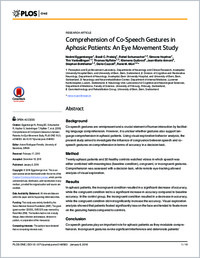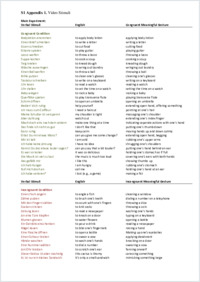Comprehension of co-speech gestures in aphasic patients: an eye movement study
- Eggenberger, Noëmi Perception and Eye Movement Laboratory, Departments of Neurology and Clinical Research, Inselspital, University Hospital Bern, and University of Bern, Switzerland
- Preisig, Basil C. Perception and Eye Movement Laboratory, Departments of Neurology and Clinical Research, Inselspital, University Hospital Bern, and University of Bern, Switzerland
- Schumacher, Rahel Perception and Eye Movement Laboratory, Departments of Neurology and Clinical Research, Inselspital, University Hospital Bern, and University of Bern, Switzerland - Division of Cognitive and Restorative Neurology, Department of Neurology, Inselspital, Bern University Hospital, and University of Bern, Switzerland
- Hopfner, Simone Perception and Eye Movement Laboratory, Departments of Neurology and Clinical Research, Inselspital, University Hospital Bern, and University of Bern, Switzerland
- Vanbellingen, Tim Perception and Eye Movement Laboratory, Departments of Neurology and Clinical Research, Inselspital, University Hospital Bern, and University of Bern, Switzerland - Neurology and Neurorehabilitation Center, Department of Internal Medicine, Luzerner Kantonsspital, Luzern, Switzerland
- Nyffeler, Thomas Perception and Eye Movement Laboratory, Departments of Neurology and Clinical Research, Inselspital, University Hospital Bern, and University of Bern, Switzerland - Neurology and Neurorehabilitation Center, Department of Internal Medicine, Luzerner Kantonsspital, Luzern, Switzerland
- Gutbrod, Klemens Division of Cognitive and Restorative Neurology, Department of Neurology, Inselspital, Bern University Hospital, and University of Bern, Switzerland
- Annoni, Jean-Marie Neurology Unit, Department of Medicine, Faculty of Science, University of Fribourg, Switzerland
- Bohlhalter, Stephan Perception and Eye Movement Laboratory, Departments of Neurology and Clinical Research, Inselspital, University Hospital Bern, and University of Bern, Switzerland - Neurology and Neurorehabilitation Center, Department of Internal Medicine, Luzerner Kantonsspital, Luzern, Switzerland
- Cazzoli, Dario Gerontechnology and Rehabilitation Group, University of Bern, Bern, Switzerland
- Müri, René M. Perception and Eye Movement Laboratory, Departments of Neurology and Clinical Research, Inselspital, University Hospital Bern, and University of Bern, Switzerland - Division of Cognitive and Restorative Neurology, Department of Neurology, Inselspital, Bern University Hospital, and University of Bern, Switzerland
-
06.01.2016
Published in:
- PLOS ONE. - 2016, vol. 11, no. 1, p. e0146583
English
Co-speech gestures are omnipresent and a crucial element of human interaction by facilitating language comprehension. However, it is unclear whether gestures also support language comprehension in aphasic patients. Using visual exploration behavior analysis, the present study aimed to investigate the influence of congruence between speech and co-speech gestures on comprehension in terms of accuracy in a decision task.Method: Twenty aphasic patients and 30 healthy controls watched videos in which speech was either combined with meaningless (baseline condition), congruent, or incongruent gestures. Comprehension was assessed with a decision task, while remote eye-tracking allowed analysis of visual exploration.Results: In aphasic patients, the incongruent condition resulted in a significant decrease of accuracy, while the congruent condition led to a significant increase in accuracy compared to baseline accuracy. In the control group, the incongruent condition resulted in a decrease in accuracy, while the congruent condition did not significantly increase the accuracy. Visual exploration analysis showed that patients fixated significantly less on the face and tended to fixate more on the gesturing hands compared to controls.Conclusion: Co-speech gestures play an important role for aphasic patients as they modulate comprehension. Incongruent gestures evoke significant interference and deteriorate patients’ comprehension. In contrast, congruent gestures enhance comprehension in aphasic patients, which might be valuable for clinical and therapeutic purposes.
- Faculty
- Faculté des sciences et de médecine
- Department
- Médecine 3ème année
- Language
-
- English
- Classification
- Biological sciences
- License
-
License undefined
- Identifiers
-
- RERO DOC 258896
- DOI 10.1371/journal.pone.0146583
- Persistent URL
- https://folia.unifr.ch/unifr/documents/304815
Other files
Statistics
Document views: 129
File downloads:
- pdf: 164
- Supplementary material: 128

